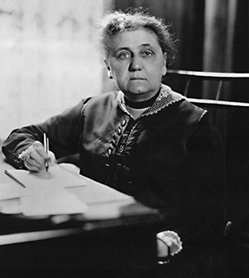Why was Jane Addams Awarded the Nobel Prize for Peace in 1931?
Trailblazing Advocate for Peace, Equality, and Community
Jane Addams: A Trailblazer for Peace and Social Justice Recognized with the Nobel Prize
The Nobel Prize for Peace has historically celebrated individuals who have made exceptional contributions to fostering harmony, advocating for justice, and promoting social welfare. Among these remarkable laureates is Jane Addams, whose pioneering efforts in social reform and peace activism led to her well-deserved recognition with the Nobel Prize for Peace in 1931.

Early Life and Activism
Born on September 6, 1860, in Cedarville, Illinois, Jane Addams demonstrated a profound commitment to societal betterment from an early age. Addams’ upbringing instilled in her a sense of responsibility and compassion, driving her to address the pressing social issues of her time. Her academic pursuits led her to become the first woman to graduate from Rockford Female Seminary (now Rockford University).
Hull House and Progressive Social Reforms
One of the primary reasons for Jane Addams’ Nobel Peace Prize was her groundbreaking work in establishing Hull House in Chicago, an innovative settlement house that aimed to uplift marginalized communities. Founded in 1889, Hull House provided essential services, education, and a space for cultural exchange to immigrants and the urban poor. Addams’ efforts fostered a sense of community and unity, laying the foundation for broader social reforms.
Addams’ advocacy extended beyond Hull House. Her engagement in labor reform, women’s suffrage, and child welfare underscored her commitment to addressing the root causes of societal inequalities. By championing policies that promoted fair labor practices, women’s rights, and improved living conditions, Addams demonstrated her dedication to creating a more just and equitable society.
Peace Activism and International Outreach
Jane Addams’ tireless peace activism further solidified her eligibility for the Nobel Prize. At the height of global tensions during World War I, she actively engaged in international efforts to promote dialogue and resolve conflicts peacefully. Addams was instrumental in establishing the Women’s International League for Peace and Freedom (WILPF) in 1915, an organization dedicated to preventing future wars and advocating for disarmament.
Her steadfast belief in the power of diplomacy and cooperation led her to participate in international conferences and negotiations, working towards a more peaceful world order. Addams’ commitment to fostering understanding among nations and promoting the peaceful resolution of conflicts was emblematic of the ideals espoused by the Nobel Prize for Peace.
Legacy and Enduring Impact
Jane Addams’ legacy as a pioneering advocate for peace and social justice remains influential to this day. Her unwavering dedication to addressing societal inequities and her commitment to promoting peaceful coexistence exemplify the transformative potential of individual action in shaping a better world.
The Nobel Prize for Peace awarded to Jane Addams in 1931 was a testament to her remarkable contributions as a trailblazer for social reform and an advocate for peaceful resolution of conflicts. Her visionary initiatives, including Hull House and the Women’s International League for Peace and Freedom, reflect her enduring commitment to fostering harmony and justice. Jane Addams’ legacy continues to inspire generations of activists and serves as a beacon of hope for those striving to create a more compassionate and peaceful global society.




